Steve Jobs DVD Review
The Anti-Social Network
Released : November 13th 2015
Certificate : 15
Director : Danny Boyle
Cast : Michael Fassbender, Kate Winslet, Seth Rogen, Jeff Daniels, Katherine Waterston, Michael Stuhlbarg
Plot : Depicting the life and legacy of Steve Jobs in three acts, each set in the short time before the unveiling of a new Jobs product. Backstage he struggles with his dysfunctional family dynamic, personal rivalries and his general attitude to his fellow man.
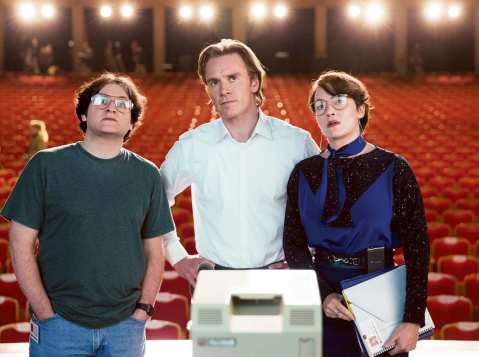
Aaron Sorkin returns with his third biopic of this decade, again returning to the digital world after he won his Oscar for The Social Network, and although with hindsight of late viewing, Steve Jobs was definite Oscar bait (only though for acting talent of Fassbender and Winslet). The award fame the film did gain was Golden Globes for Winslet and Sorkin and a BAFTA for Winslet to. But to back track to look at the films building blocks, as accustomed for Sorkin we get an elite director to guide his screenplays, here in the form of Danny Boyle, who’s last appearance with Trance left both audience and critic’s confused and ultimately disappointed. So what better way to re-enter critical appeal with a biopic, a genre known for its ‘purpose’ of being critical and award bait. Additionally, what made the film stand out was Sorkins limited scope for the film, regarding to his three acts setting, and although this may sound like a claustrophobic challenge, it appeared to play to Sorkin strength of fast paced fiery dialogue nature. For many this may be a disappointment as it fails to give a large overall insight as to how Apple (to the desired biographical extent) as The Social Network did and captivated audiences.
So straight of the bat to address Sorkin’s contribution of the film, this is the most ‘entertaining’ screenplay he has made. In particular, regards to the script here, which is the films foundation, he has created a symphony of crazy paced intelligent and gripping dialogue. The script manages grips audience in the same surprising nature that Whiplish final act does (not quite to the same memorable quality), to depicts the stress of backstage antics perfectly while also effectively intertwining the more emotive parts of the plot. There are some issues though, some dialogue may go over the heads of some audience members as they struggle with the speedy pace of the film. Also it does fall into the traps of most biopics of late being that with the very direct and blunt way in which it delivers the emotive aspects of the film, explaining each emotion to the audience isn’t always needed. And although this blunt technique is brilliant (really brilliant) for the plot points not connecting to family, the more personal emotive sets are rather lacking in subtly to the drama, for some this may be perfect, others slightly spoon fed. For this reason, it still functions as ever so slightly generic biopic material, but thankfully its generically perfect to take itself up a level.
Now for the under rated aspect of the film, Boyle’s contribution, for a director who is no stranger to the limited claustrophobic set, with the chillingly shot 127 Hours, it is a joy to be reminded of his talent. In many regards his work complimented the music score of Daniel Pemberton (a little known composer who has brought great added tone to films such as The Awakening and The Counsellor) to create a film that delivered Sorkins script in a way to create this enthralling orchestrated drama piece, they match was made for each other. The gripping following story within a limited time was slightly reminiscent of Birdman, of course not as memorable due to a failure to shake off a generic biopic aura. Alike the script, some of Boyle’s shot types can drift into obviously emotive ground, overall Boyle was very inventive with both his own additions to the film, presentation of the crowd was an effective tension builder, as well as the structure of Sorkin’ set poignant pieces, particular an address to the team before they escape from him into an elevator as he barks instructions, which uses has the one shot feel that was maintained in Birdman to create a great level of realism to the scene.
For the acting force in the film, before the heavy hitter are addressed in the film, there was a surprise gems across the supporting cast, a needed addition to the film, as many biopics fail in placing to much of the acting prowess within the lead characters. These other performances made the film much richer and gave Fassbender abusive Jobs a sense of reality as other actors reacted to it with such a high standard, a recent biopic that could have used this was Trumbo, also bait this past awards season. Out of all of the supporting; Seth Rogen, Jeff Daniels, Katherine Waterston, it was Michael Stuhlbarg who was most notable. Despite his very limited screen time and slightly type cast nature, Stuhlbarg embodied the little man under the pressure of the Jobs titan to an extent that had great chemistry, particularly in the final act, with his experience in nervous mannerisms and down-trodden acting abilities gained from other roles where on top form for this role. Personally Fassbender turned in a better performance than Winslet, but both actors in another year (with 2016 having huge acting talent across all categories) could quiet easily have taken home all the statues.
Steve Jobs is the biopic of the year by many a mile, but isn’t enough of a game changer to gain all the award success that it could have done. Sorkin has delivered his probably least realistic (as the dialogue sometime feels more staged for effect) but most invigorating script within the decade, you can definitely see the slightly cliché nature of A Few Good Men slipping into his recent sophisticated style. Regardless he has anchored himself as the best repeat offender of the true story genre within this decade (across all film making aspects) with an amazing trilogy of contribution with five years. And Fassbender has gone from strength to strength, having come a long way from breakout performance Hunger typified with 2015 being his strongest year with this film as well as lead in Macbeth (one of the strongest Shakespeare films to date). Fans of Sorkin will not be disappointed by this film despite its flaws, which can be summarised as the following. Sorkin was ambitions with his choice of the three act setting, but with making screenplays half come from script and half from the acting advice, set pieces and general scene construction. With a limiting setting you get a tunnelled screenplay and a miss on the rich set situations that made were present in Moneyball and The Social Network.
Verdict : Whatever genre falls or story issues that exists here, Steve Jobs is irresistible as an insightful and gripping drama. Sorkin has pulled it off again, but this isn’t a a one man show as the title suggest, across the filming making board, high standard.
Verdict : 4/5
Quote : “I’m gonna put music in your pocket.”
Mini review: Freeheld
Year: 2015
Certificate: 15
Director: Peter Sollett
Screenwriter: Ron Nyswaner
Cast: Julianne Moore, Ellen Page, Michael Shannon, Steve Carell
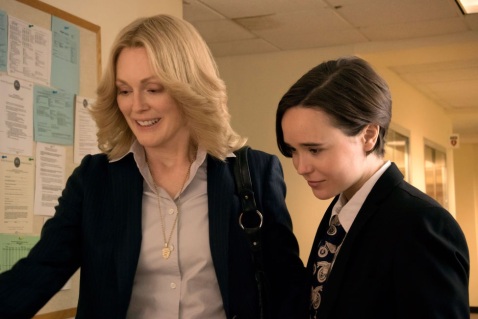
Julianne Moore stars as Laurel Hester, whose struggle to transfer her police pension to her partner Stacie Andree (Ellen Page) in the wake of Laurel’s terminal cancer diagnosis had a lasting impact on gay rights in the States. Despite excellent central performances from Page and Moore, the by-the-numbers screenplay and straightforward direction leave Freeheld feeling ultimately televisual. Frustratingly, the civil rights element and domestic drama element seem to jostle for position, each ultimately undermining the other as Laurel and Stacie’s relationship is not allowed sufficient screen time before the cancer diagnosis and subsequent legal struggle (with the supporting characters it brings in) become the central focus of the narrative.
Verdict: 3/5
Image: Fandango.com
BFI Flare review: The Girl King
Year: 2015
Certificate: 15
Director: Mika Kaurismäki
Screenwriter: Michel Mark Bouchard
Cast: Malin Buska, Sarah Gadon, Michael Nyqvist, Patrick Bauchau
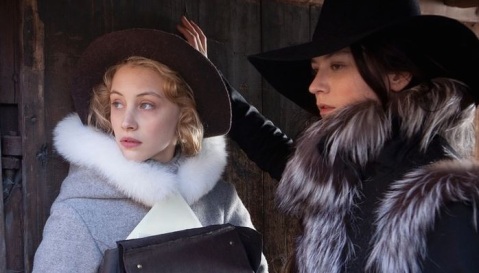 Amid the Catholic-Protestant conflict raging throughout 17th century Europe, Kristina (Malin Buska), only child of the late King Gustav II of Sweden, is raised under the watchful eyes of Sweden’s Lutheran court and it’s chancellor, Axel Oxenstierna (Michael Nyqvist). However, when Kristina comes of age and begins to rule as queen, her* radical proclamations and unconventional conduct in private cause tensions within the court.
Amid the Catholic-Protestant conflict raging throughout 17th century Europe, Kristina (Malin Buska), only child of the late King Gustav II of Sweden, is raised under the watchful eyes of Sweden’s Lutheran court and it’s chancellor, Axel Oxenstierna (Michael Nyqvist). However, when Kristina comes of age and begins to rule as queen, her* radical proclamations and unconventional conduct in private cause tensions within the court.
A Sweden-Canada co-production, The Girl King is a valiant if ultimately flawed attempt to illustrate the life of an extremely unusual monarch. Buska, already a well-known theatrical actress in Sweden, is a perfect choice for the intelligent and rakish Kristina, and is a commanding screen presence. However, one can’t help wonder if she is being held back slightly by the requirements of performing in a second language (other than the occasional exchange in French, the film is spoken in English), as her delivery of the lines doesn’t quite equal the exquisite subtlety of her facial expressions. Michael Nyqvist (known for the Swedish Girl With the Dragon Tattoo trilogy) does admirable work here as Sweden’s Chancellor, showing a surprising deftness in the more comic moments. The exchanges between Axel and Kristina, particularly when he is trying to delicately approach the subject of her tomboyish nature, are some of the best scenes in the film. Other highlights are Sarah Gadon as Kristina’s love interest, Countess Ebba Sparre, and Patrick Bauchau as the French philosopher René Descartes, with whom Kristina strikes up a correspondence which scandalises the pious members of her court (while Sweden and France had a mutual enemy in Germany, France’s allegiance to the Pope made their truce an uneasy one).
Despite the quality of the acting and some clever cinematography courtesy of Guy Dufaux, The Girl King ultimately feels a little ramshackle. Bouchard’s screenplay makes much of Kristina’s love for Ebba, and while it’s refreshing to see such an unapologetically queer historical figure pursuing their desires, the arc of Kristina and Ebba’s romance feels clichéd and despite an elegant turn from Gadon as a character Ebba is paper-thin. Indeed, even Kristina’s crisis of faith- surely hugely important for her as a character- feels glossed over here, and this lack of achievement of the script in really getting under her skin leaves the whole piece feeling too light. This, coupled with the slightly uneven tone where moments of high camp sit uncomfortably next to overwrought emotional scenes, serves to eject the audience from the narrative. A few moments of sloppy editing further underscore these problems.
All in all The Girl King feels like a film which is punching below its weight somewhat. However, there is still much to like here, particularly given the dearth of LGBT historical figures represented on screen. The narrative holds together well enough to showcase the film’s stronger components, and if this is Malin Buska’s Hollywood calling card she will certainly be one to watch in the future.
Verdict: 3/5
BFI Flare is the British Film Institute’s annual LGBT film festival in London. More information about the festival can be found here.
*A note on pronouns: in terms of the historical record, there seems to be a fair amount of debate between academics over both Kristina’s gender and sexuality, with varied theories suggesting Kristina may have been any one of what we now know as gay, bisexual, transgender or intersex. As there is little historical consensus on this, and as the film portrays her fairly unwaveringly as a cis lesbian, I have used female pronouns in my review. If this is a problem let me know and I can edit to gender neutral. Many thanks to my historian friend Katie for doing some academic investigation into Kristina’s history.
Image credit: facebook.com/TheGirlKingFilm
Trumbo Review
I am Spartacus
Released : February 5th 2016
Certificate : 15
Director : Jay Roach
Cast : Bryan Cranston, Helen Mirren, Diane Lane, Elle Fanning, Louis C.K., John Goodman, Michael Stuhlbarg, Alan Tudyk
Plot : In the late 1940’s a series of Hollywood workers, including screen writer Dalton Trumbo (Cranston), are arrested and blacklisted for being a member of the communist party.
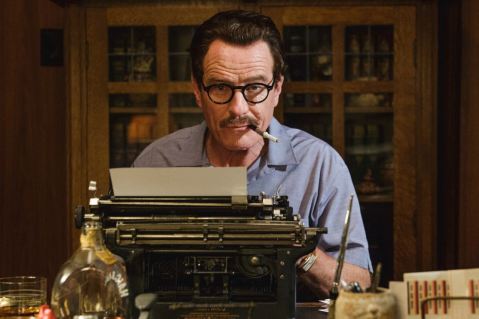
Bryan Cranston follows up his television career with his first of ‘professional’ acting, meaning his first lead in a film that is of a staged serious acting nature. As what better creates the platform for serious as well as high standard acting than and biopic, especially one which has one of the names of the person in the title (examples include Ray, Gandhi, Capote, Amelia, J.Egar, all are bait for one thing). As is the pattern with these types of motion pictures, there has been an across the broad set of nominations for Cranston portrayal of Trumbo, as nothing gets the awards interest like a biopic. What makes this film more favorable to film critics and film awards is the story’s link to Hollywood’s past, which is one of the most eye opening of films about films. Hence alike The Aviator in the sense of the films revolution around a single built to impress performance as well as its ties with the developing years of cinema. However the difference here is that Trumbo’s story linked to cinema is much more prevalent in the minds of some audience members (due to the plot point of Sparticus) and a much more entertaining focus on film with more actors impersonated and a better feel for the film making system developed.
On the side of screenplay, the films has a slightly weak and less gripping opening. The film demonstrates from the outset the persecution the Trumbo and others like him endured without ample time to get to know the characters, hence this isn’t as effective emotionally as it could be. The script suffers in so other aspects as well, in some cases treading water between what is realistic and what is over dramatized dialogue. Trumbo’s character himself is the pinnacle of this issue, with dialogue that is outlandishly brilliant, but is it large than life. The film is self aware of this fact in a line delivered by Louis C.K characters, and on the whole the entertainment value of the script outweighs the thoughts that it stumbles at points being cliche or too purpose built. These issues are also largely lost in the mist of additional aspects of the film where it effectively tackles the topic with a brilliant attitude towards subject matter (not too seriously), integrating a family dynamic that while isn’t unique is well executed, and an all round vibrant and well paced script, and well steeped in the Hollywood history (with the right measurement of cinema legends such as John Wayne and Kurt Douglas) But many lines in the film are a stretch dragging the film out of reality if for the briefest of moments.
The directorial work from Jay Roach if nothing else seems him step into a new chapter in his little know career. With past credits of directing work being the of the Austin Powers series and two thirds of the Meet the Parents series, he is steeped in comedic credibility. This is mostly likely why this is one of the better dramas for him to work on, as it is (while not consistently due to story line) a funny film. For the most part Roach function within the film was too position Cranston as well as possible to allow him the reel in those award nominations. This is very obvious for some parts, such as a unusual shot of an extreme close up on Trumbo’s eye as we see the reflection of his name on screen as he sits in one of his movies. While this may attempt to appear authentic and poignant, it does seem to serve a great advantage to showing how well Cranston can tear up. Not that this is bad directing, but it isn’t particularity adventurous or risky.
Cranston’s Trumbo portrait does as stated before, have one foot in the imaginary, it takes some plot development to be able to get on board with the character to a degree that audience can have an emotive response. This is by no means the fault of Cranston, but rather the script, and by a third way thought the film Cranston had tackled the character down to reality and made him more than enjoyable. While the character isn’t a wholly complex one, emotionally speaking or have a huge amount of character development it is a feet to pull the character off. As on paper he is one that many could quite easy ham up. So this Oscar nomination is award for the ability to play the unusual character with convictions as well as being able to tear up (to a believe extent) at a drop off a hat and get that crock in the voice in such scenes to really give the audience the feels. While the emotions for the audience might not match Trumbo’s he does tick all of those box’s, maybe with a little less charisma the character would have been fully landed to give an emotional performance.
Trumbo entering this award season listing for one reason only, Cranston performance, in this film containing all the conventions of a typical bio pic award bait film. This doesn’t make it a cheat of talent just due to its formula, but it does make it recognizable as a sub genre of film. Within this sub genre the film won’t be ranked as higly as others, but there is still strong work and entertainment involved. Its a memorable performance from Cranston who manages take his skills as a strong character actor from television to film for the the first time in a performance which is overshadowed by other talents of this year. Trumbo is a eye opening film about a side of Hollywood not well documented, and for fans of the movies it will be a joy to see this historical pieces steeped in classical cinema history. And along the way you’ll a solidly entertaining charismatic performance from Cranston with a script to boot, full of smooth and fun dialogue, unfortunately there isn’t enough skill to make it a bio pic hit. But remember, that many of the bio pic greats are some of the best in cinema history, not always as easy as it looks.
Verdict : Cranston embodies a larger than life character from a script that has a story which is eye opening and a brilliant period piece, as well as a tad charismatic and cliche. Goodmans a riot as well.
Verdict : 3/5
Quote : “I’m in this for the money and the pussy and they’re both falling off the trees!”
- in 2016, 2D, Cinema, films, Genre: biopic, Rating: 4/5, Reviewed by: SO, Reviews
- 1 Comment
Spotlight Review
From The Man Behind The Cobbler?
Released : January 29th 2016
Certificate : 15
Director : Thomas McCarthy
Cast : Mark Ruffalo, Michael Keaton, Rachel McAdams, Liev Schreiber, John Slattery, Stanley Tucci
Plot : The true story of one newspaper and a team of journalist given the case of a Priest accused of molesting more than eighty boys. As they follow the story down the rabbit whole, they start to discover a mass cover up within the Catholic Church.
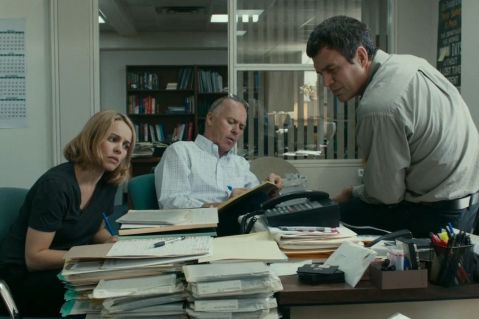
Yet another entry into the Oscar run hit British screens late and just in time for the BAFTA ‘s, where we have the true life account of the newspaper team that lead investigative work and broke the ice onto the Catholic Church’s abusive controversy. Weighting in with six Oscar nominations including best picture, directing, original screenplay and two best supporting actor. Spotlight is at face value one of the ‘dryer’ films to be nominated for the best film this year, despite controversial subject matter. Recently in British boards being criticised by some for being too under dramatic in its attempts to follow the investigative process to the letter and finding its long run time a drag. The aspects criticised can be seen in the film, but when one considered the topic matter being dealt with, it seems like a story that needs to be dealt with delicacy and, as reporting should be, a unbais portrayal. Not all historical films should have the purpose of throwing stones and making obvious blames, especially when the story is still fresh and continuing to a large extent. Hence Spotlight journalistic approach tip toes around the fire as it should, avoiding turning into a smear campaign it could have easily.
The story focuses around a four person team of Spotlight, an independent investigative unit working for the Boston Globe. As a new Jewish editor (Schreiber) arrives, his first action is to encourage the team to investigate the case of one priest accused of molesting eighty boys. And so down the dark trail the team emerges. From a writing viewpoint the film does suffer from similar minor issues that other biographical Oscar baits have suffered, this being that not all finer details will be taken in by audience. The script is amazing in its ability to maintain realism within the technical world, with a film teaming with such dialogue that has twists a turns. Audience will follow the progression perfectly, just maybe not every single cause for new discovery. Where the script is even more impressive is its ability is to keep the story grounded within central characters which account for much of the films enjoyment. Another minor issue that could quiet easily be picked upon by some criticise is that of the characters used to portray (of which there are three) molested victims, some of which could be argued to be extreme or stereotypical in their fractured persona’s.
Aside from the entertainment value of character acting and realism drama, it may be the surprisingly skilful work of Tom McCarthy that felt extremely authentic and thoughtful. Despite being subtle and maybe less noticeable to cinema goer’s not hooked by the movement of the camera, it is film filled with both unique and meaningful camera work. Some aspects of his work more obvious than others, with a combination of zooming in and zooming out effect for poignant set pieces within the main office of Spotlight. As well as other works such as especially iconic opening movement showing the priest pull away from a police station to then merge into a point of view shot with a onlooking police officers. Also there was the effectively straightforward use of wide shots to depict character movement, all of which added more to the scenes authentic nature. While these effects aren’t ground breathtakingly unique, in to a year when Iñárritu is playing that card, it was brilliant to see a director who had though through the meaning behind shots so well and brought an extra element of directorial art to a film which could have easily been ninety percent over the shoulder shots.
Now to move onto the acting aspect of the film, in which the nominations across awards boards have not been consistent, with Ruffalo gaining BAFTA and Oscar nomination, and McAdams gaining ‘just’ the Oscar nomination. For some reason the Golden Globes didn’t hold these gems as highly. As well as these two actors work the whole cast functioned together exceptionally to really build a believable office team dynamic. Schreiber for example turns out a career best performance in a solid turn at subtle acting, and Keaton also stands out with his ability to change gear from his previous eccentric characters to more human ones. Ruffalo however does steal the show for a number of reasons, firstly his ability to master the unusual mannerisms of his character which despite being obvious are still executed with great precision. As well his characters more emotional response to the story being a joy to watch, as Ruffalo doesn’t flinch to turn out set pieces of dramatic acting which are truly stirring and real. These two factors will make him stand out more than the other actors due to their straighter performances, but this doesn’t take away from Ruffalo (or any other the actors) skill.
Some could claim that a film such as Spotlight has a slight protection from criticism due to topic matter dealt with, as some biopics already gain praise just for topic matter, The Butler being one in recent memory. But Spotlight doesn’t fall under that category, of course the investigate drama is more tense due to case, but its has so much more to offer than and insight into a cloudy and dark topic. Although for many cinema goers the story might speak louder than the skill put into the film, but due to class performances from McCarthy (both writing and directing) and Ruffalo as a beacon of a top call turn out of cast, there are moments when you appreciate them more than the story, and the story is a fascinating one. Though it is unlikely to walk away with many of the awards it is nominated for this year, it has enough subtle, low-key, professional work in it to be a real professional biopic. Like other films of this years awards it doesn’t beg the bigger audiences due to pace and a quiet nature, buts it’s a slow burner with the ability to remain in mind after viewing due to both talent and topic.
Verdict : Your standard sell out success with highbrow critics. Enjoyment is the wrong word to describe the film, due to style and topic, which is why it may lose out on awards and box office success. Admiration, that’s a word for the story and crew.
Verdict : 4/5
Quote : “It’s time, Robby! It’s time! They knew and they let it happen! To KIDS! Okay? It could have been you, it could have been me, it could have been any of us. We gotta nail these scumbags! We gotta show people that nobody can get away with this; Not a priest, or a cardinal or a freaking pope!”
Legend DVD Review
The Dark Kray Rises
Released : September 9th 2015
Certificate : 18
Director : Brian Helgeland
Cast : Tom Hardy, Emily Browning, Taron Egerton, Christopher Eccleston, Sam Spruell, David Thewlis, Paul Anderson
Plot : True life story of the rise of the Kray twins (Hardy), Reggie and Ronnie, during the 1960’s. Two of the biggest gangsters that London and England has ever know. The film see’s them battle police, rivals, love and each other.
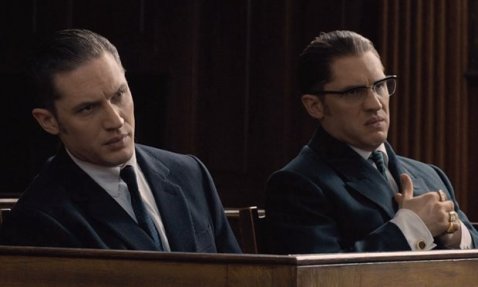
Legend is the remake of the little known British gangster film The Krays (1990) which tells the truth life story of the Kray twins, some of London’s most famous gangsters. To man the remake we have Oscar winning screenwriter of L.A Confidential (as well as nominated for Mystic River), Brian Helgeland, directing and writing the film. It is also packed with rough type cast actors to man the gritty London foot soldiers of the Kray’s, such as Paul Anderson (Peaky Blinders) and Taron Egerton (Kingsman: The Secret Services) both most famous for their likeable English accents and rude nature. And topping the film is Tom Hardy, truly flexing his acting muscles in as many unique roles as possible. First a film where he is the only thing on screen for the whole 87 minutes, now he embodies both main characters of Legend.
Straight out of the gate if audience were expecting a wall to wall gritty London based mob film, filled with cultural richness and brutal violence then they might find it unpleasant to have a large act of the film taken up with romance. Hence there is a surprising edge of Goodfellas female involvement in the film which plays a big part. This could be a positive attribute, as it sticks to the films true story, adds to the dynamic of the twins relationship and adds depth to the film, in premise. However the execution of this aspect of the film doesn’t fly as high as other aspects of the film, which it needed to in order to occupy so much screen time. The poor quality of this romance between Reggie and Frances (Browning), a local office girl who dreams of more and falls for Reggie charming nature and glamorous lifestyle, is hard to pin point as it is certainly not the acting. Due to the writing mostly the romance was rushed into placed from the start with little exploration of why Frances is so immediately mesmerised by Reggie. The doomed loved story then continues to spiralling down due to the pressure of gang life, Ronnie’s character and Reggie late working nature, a gangster love dynamic that has been explored before. The writing however didn’t hook entertainment or tug at heart strings, due to this aspect of the script being more square than the rest of the film. Obviously the films tone needs to alter slightly between relationship and crime genre, but it was obvious to see that Helgeland found more imagination and pleasure for writing the crime aspects.
Continuing on to Helgeland’s work as both screenwriter and director of the film, there are aspects of his work that kept the film more than afloat, but thoroughly enjoyable. For script purposes of the film Helgeland was brilliant and turning out pitch perfect cockney humour between the characters full of zest and wit. The only issue is that of the film being unable to trade in its entertainment value of humour and action at the start into drama and tension towards the end, ultimately the film suffered from pacing. As the initial ecstasy enjoyment of being immersed into the world of the Kray’s and their rocky relationship doesn’t quiet transfer into gangster drama of an equally high calibre for much of the second half. As the film falls into a bleak and fairly dry drama between the nature of Ronnie and the suppressed frustration of Reggie. However Helgeland’s work is top class in aspects of humours and invigorating screen writing as well as directorial work with a set that is top class at building a beautiful and believable world of 1960’s London to stage the legacy to audience, but not quiet make it as human for the ‘colder’ side of tale.
The secondary heavy weight talent on the film is of course Tom Hardy, being much more prevalent in recent cinema history than Helgeland, and who’s work in this film is the framework for the entire film. Hardy demonstrates true talent as a chameleon actor, being able to deliver brilliant chemistry between himself as he plays both role. We aren’t totally sure how the shooting process went, but it doesn’t matter as the tip toeing between the two brothers ticked the only box that it needed to. This being the fact that the brothers felt like completely different people, characters and actor, of course the audience all know the truth but for Hardy to walk in each day and create the two persona’s so effortlessly is brilliant. Some could say that the task seems fairly easy, but Hardy had to create chemistry that would translate into believable conflict and relationship, hence act out one scene and then remember his mannerisms of the scene to construct the reaction of another character. Where some actors struggle to maintain their half of one scene, Hardy had to construct an entire dual character arc.
Legend hits as many hits as many good notes as it does bad, but when playing in the gangster genre there needs to be exception panache to allow for people to stand and recognise, but at the end of the day it’s still great fun to be taken along for the ride. Helgeland was able to beautiful and stylishly recreate another crime ridden world for the story to be set, and worked wonders in stage a snappy and crisp dialogue to initially get you on board with this world. Tom Hardy turn out a solid performance as does Egerton and Browning, but these characters find more to work with initially than when their relationships hit the rocks, resulting in quiet noticeable issues with pacing. And maybe the running commentary could have been a little more imaginative as memorable, rather than a slightly plain description of the story. But its undeniable the fun available here, filled to the brim with gritty violence that almost comical when you’re not cringing, cockney accents with plenty of four letter words, and an entertaining enough chess game of gangs and police. Of course Hardy fans will have a blast here as well.
Verdict : Hardy gives a brilliant dual character performance, but he had a little less to work with on the ending character drama then the initial blast of brother hood. This issue exists for the films romance, story and overall entertainment. Better action crime comedy than stirring character drama.
Verdict : 3/5
Quote : “What is that? I come here for a PROPER shootout! What you gonna do with that rollin pin? You gonna bake me a cake? What I want is a shootout, a SHOOTOUT IS A SHOOTOUT… like a Western!”
The Big Short Review
The Real Wolves Of Wall Street?
Released : January 22nd 2016
Certificate : 15
Director : Adam McKay
Cast : Steve Carell, Ryan Gosling, Christian Bale, Brad Pitt, Finn Wittrock, John Magaro
Plot : This true story begins in early 2005 and follows a small pocket of financial business men who notice, research and discover the flaw in the American housing market and the imminent effect it will have on the world economy with the 2008 recession. They decide to bet against the American economy.
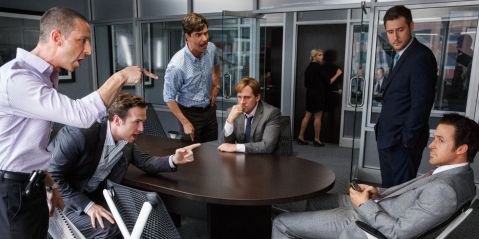
As award sessions continues with the BAFTA’s and the Acadamey Awards around a month away, The Big Short emerges as a nomination stand out (not able to compete with some heavy hitters such as The Revenant with twelve however), British audiences now get a taste of Adam McKay. The film has been given the same nomination between both awards boards, with editing, adapted screenplay, directory, supporting actor (Bale) and film. The adapted material aspect of the film has a prestigious source in cinema history, as it is another book adaptions from Michael Lewis. This being the author behind past years award hopeful’s such as Moneyball and The Blind Side. While the director amusingly is quiet new to the award scene, Adam McKay (director of both Anchormans, Step Brothers and The Other Guys) has gained his first BAFTA and first two Oscar nod’s for this film due to his involvement of both writing and directing. But it is perhaps this comic edge that has earned it the best film position. As it’s an amazing story that needs a rough edge of sarcastic and blunt humour to make all the numbers, technical terms and the huge disaster it deals with to turn it into a great film.
The film follows the initial working of one man, Dr Michael Burry (Bale), a financial wizard who is a self diagnosed aspergers sufferer. From many late nights stuck to a computer screen shifting through the records of all the mortgages on the market, he discovers the dangers of the late payments. This eventually leads to him betting all of his business money against the market predicting the eventual crash. The huge flow of money attacks two other groups, one headed by Mark Baum (Carell) and the other Jamie Shipley (Wittrock) who both see the potential for huge benefit. This is the brief outline of the film, which it attempts to stick too despite the huge technical complexity of the issue at hand. This is a film that perfectly deals with its complex topic, by both humorous sarcasm and wit to help make the financial details easier to swallow. It is typified by the multiple outtakes where celebrities (of which are perfectly cast for multiple reasons) interrupt a scene steeped in technical language, it break it down into metaphors and terms the audience can understand. This combined with the effect of Jared Vennett (Gosling) narration and direct address makes the approach very similar to that of The Wolf Of Wall Street.
This atmosphere of the film might have been added to the film largely by McKay’s involvement of the screenwriting aspect of the film, to what extent is unknown. Due to the serious dramatic tones of Michael Lewis previous books which have been adapted, it could be argued for none readers that perhaps the humour was a large impact that McKay had to the film. If so then hats off to him for a large part of the appeal, enjoyment and greatness of this film. While the humour is very reminiscent of McKay’s other films, being sweary and rude, it is pitch perfect for this adaptions. McKay was able to tip toe between the drama and humour evenly and brilliantly throughout most of the film. Up to the climax which has a big mode shift as the reality is unveiled to the audience. This change in gear atmosphericaly is sudden and clean to the bone, but overall needed for the films messages to resonate with the audience. McKay’s work of direction was notable, with unique effects such as breaking up scenes with montages of stills of culture (giving the editor a nightmare that they dealt with expertly) and as mentioned the presentation of the gear change.
For the acting side of the film there is both good execution and tackling of the characters development along with the final act of the film. Of course the heavy hitter of the film is that of Bale as he takes on a new skill in his acting career of mental illness. While the film doesn’t explore the characters backgrounds to a huge extent, the work of McKay to devote Bale the unbroken screen time he requires and Bale’s repetition of key mannerisms and easy with emotional scenes makes the performance a worthy contender this year (despite him not being a favorite). Gosling was irresistibly enjoyable as was most of the supporting cast (Rafe Spall, Hamish Linklater, Jeremy Strong) to being the comic relief for the most part with a montage of funny blunt one liners of banter between one another. Steve Carell had a fairly simple character to deal with, perhaps why the praise hasn’t been as large. Despite this Carell second outing for a lead for a drama again pleases audience with a solid performance hammering home is talent as an actor with a career outside comedy.
The Big Short however as it most likely to do fails on most accounts on translating all of the little details that surround the story. But its a feet to even attempt a film adaptation of a book that is brimming with such dense technical story. So this means hats off to McKay in his efforts to take all that he can and make it funny. Some will undoubted say that the events are one for a film loaded with comedy. But as a pieces of cinema it is funny as it is dramatic, even if its shouldn’t be making jokes in the first place. And for the most part of the film there is much entertainment to be found in the film despite the failing to grasp many of the details of the technical side of the film. Some may find that the film has resemblances outside of the story topic to The Wolf Of Wall Street with the direct audience address, humor style, attitude to subject matter and directorial effects. But due to the more ‘human’ story being told, it does have a warmth the superior Scorsese film lacks. It’s up to the individual audience member as to whether the similarities jeopardize quality of film.
Verdict : You will laugh, you won’t cry and you won’t understand all of it. But you should appreciate talent involved, resulting in a film as eye opening as possible while maintaining entertainment.
Verdict : 4/5
Quote : “You wanted to be rich, now you are.”
Mini review: Joy
Year: 2015
Certificate: 12A
Director: David O Russell
Screenwriter: David O Russell
Cast: Jennifer Lawrence, Robert DeNiro, Dascha Polanco, Bradley Cooper, Isabella Rossellini

David O Russell and Jennifer Lawrence’s latest collaboration is a frustratingly histrionic dramedy loosely based on the life of Joy Mogano, inventor of the self-wringing mop. While Lawrence is- as always- note perfect and the supporting cast all put in strong performances, O Russell’s love of surreal hyperbole obstructs rather than enhances what should be an inspiring story. While there are several strong sequences (such as a particularly fist-pumping late-stage confrontation with a rival businessman), it feels overlong at just over two hours and one can’t help but feel a little more simplicity and a little less self-aware oddness would have created a more cogent piece.
Verdict: 3/5
Image credit: foxmovies.com
The Program Review
Breaking Bike
Released : September 16th 2015
Certificate : 15
Director : Stephen Frears
Cast : Ben Foster, Chris O’Dowd, Dustin Hoffman, Jesse Plemons, Lee Pace
Plot : The biopic of Lance Armstrong (Foster) as he fights through cancer, rise to the sporting hall of fame, and then shames it with the discovery of his insentient performance enhancing drug usage. His story is obsessed over by journalist David Walsh (O’Dowd).

Stephen Frears third biopic film, moving from that of a partiotic queen through struggle of family crisis, and another sweet old lady finding her son, on to the man how lead the biggest sporting drugs controversy in sporting history. A story of much more dark and thrilling nature, which needed to convert the touching and moving work done of on his last two instalments into shock and awe. The story itself carries with it a large amount of that awe within the script, how much of it is dramatised is up for question, in particular extent of corruption as well as David Walsh’s involvement with the story. Providing Frears with great base material of which to build upon, with a story which is a real pitch change for Frears after perfecting his craft of the moving biopic whit Philomena and The Queen.
Additionally to we have the apperence of Ben Foster in his first main star role. As some biopics do including The Program, there is an large amount of reliance on the lead character, and this was more relivant to this film than other of recetn years such as Steve Jobs. As The Program carries with it little extra luggage in the war of supporting roles from actors that are well known (not to mean they will deliver poor performances), meaning Ben Foster carried the film alongside that of Frears (not to the same extent as Fassbender and Boyle). But the script provided as well as the brillliantly insightful account of the cheat, some solid material for the drama between that of Armstrong with Walsh as well as co-rider Floyd Landis (Plemons). While Armstrong and Walsh have limited time on screen, the script balanced the presentation well with the impact that both character have on each other worlds, something that will never had been gained from reading the news articles (gain the extent of this reality is questionable). This is the main drama of the film included, as the family life of Armstrong is almost entire left out, apart from a wedding, despite the man having five children.
So for the first man to carry the half of the film is that of Frears, who’s work on Philomena was close to the quality of the enjoyment of the film, which was immense. Frears sets the scene effectively with dated footage of the tour, followed by a low camera angle behind Lance, making him tower over the audience, an effect that is continued throughout the film. Despite this and other directorial techniques not being ground breaking, it was enjoyable to see some meaning behind the presentation of the film. And despite its simple nature the little techniques that are in place do prove simplistically effective, for example the repeated effect of low camera angle to present Lance proved very poignant in a scene showed in the trailer when he becomes rattled by the imposing nature of his dope supplier informing him of the imposing allegations in his home. Some what effort was imploued from Frears was clever and added to the exprence, but his work was not has appreciable or memorable as in previous works, where it felt as if he was more in tune with the stories.
The fact that Frears work wasn’t as dominate within the film may be due to the fact of the utterly absorbing performance of Ben Foster that stole the show. Some may argue that similarly to the new Steve Jobs the character is presented in a overly distasteful way for the sake of entertaining cinema, but with a character that is one of the most famous cheats, the representation is acceptable and uncanny to the real Lance. This is all the way down to the fact that Foster and Armstrong even look similar, which added a chilling edge to the performance. Not that this was needed, as Foster presented him as man who that you could both understand and reveal in his twisted morality. Scenes that provided scenes of striking acting skill, where that of the recognition of ‘defeat’ after his attempted come back into the tour, as well as the inevitable breaking point of when he is caught. This is to name but a few in a performance that is sound throughout, and despite the characters ‘evil’ nature is completely enjoyable to watch. A piece of work from Frears which was simple but effective in the positioning of Fosters performance was that of brief recreation of the famous Oprah interview.
The Program is film which by no means rest on the entertainment of just the story, with may aspects of the film providing high quality. And as the goal of a biopic is, it needs to remain thrilling and absorbing despite the audience knowing how it is all going to end, which the film does and then some. Adding to the enjoyment is that of surprisingly strong performances of that of O’Dowd, how captures the driven and slightly everyday man striving for morals to a surprisingly high level given his previous work. And another performance from that of Plemons, who plays the worker overshadowed and mistreated by that of Armstrong, who battles with his morality as well as his own drive to become the champion, which he is forced to suppress. Both of which acted to compliment the run away star of the show that is Foster’s performance, who dipictes anger, deceit, ego and despair beautifully in a character arch which we know who it plays out. But we are still driven to see each scene, as Foster role provides to be one of the best ‘villains’ this year so far.
Verdict : A true story, with true trills, and utterly absorbing insight into the true story, and thanks to carer best work from Ben Foster and Chris O’Dowd, a brillliant character study as well. The only hold back is Frears nothing being as good as always, but just because he ins’t firing on all cylinders, doesn’t mean that the film isn’t.
Verdict : 4/5
Quote : “And I will not be brought down.”
Mini Review: Selma
Released: 6th February
Certificate: 12A
Director: Ava DuVernay
Screenwriter: Paul Webb
Cast: David Oyelowo, Tom Wilkinson, Cuba Gooding Jr., Carmen Ejogo, Lorraine Toussaint, Oprah Winfrey, Tim Roth
Director Ava DuVernay lends urgency to this Martin Luther King biopic focusing on the months leading up to the signing of the Voting Rights Act of 1965. King (David Oyelowo) and his organisation plan a march from Selma to Montgomery in Alabama to protest the entrenched racism preventing black people from voting in the US, despite them technically having the right to do so. Webb’s screenplay artfully illustrates the myriad tensions present in America at the time, and also within King’s organisation and his personal life, and the political conversations are both fascinating and illuminating. Oyelowo’s performance is extraordinary, showcasing both King’s superlative strengths and his very human weaknesses and doubts. The confrontations between King and Tom Wilkinson’s sympathetic but pragmatic President Johnson are particularly engaging, but all of the strong supporting cast bring gravity to the picture. DuVernay’s dynamic direction brings the drama to life, giving a sense of movement to the conversation-based scenes and shocking impact to the protest set-pieces. The knotty nature of the events in question at times means the pace slips slightly, and perhaps the film runs a little long. However, as a deft and complex portrait of an important historical figure and event told in a truly cinematic manner, Selma is an accomplished success.
Verdict: 4/5
Image credit: selmamovie.com
Recent Posts
Archives
- September 2017
- February 2017
- January 2017
- November 2016
- October 2016
- September 2016
- June 2016
- April 2016
- March 2016
- February 2016
- January 2016
- December 2015
- November 2015
- October 2015
- September 2015
- August 2015
- July 2015
- June 2015
- May 2015
- April 2015
- March 2015
- February 2015
- January 2015
- December 2014
- November 2014
- October 2014
- September 2014
- August 2014
- July 2014
- June 2014
- May 2014
- April 2014
- March 2014
- February 2014
- January 2014
- December 2013
- November 2013
- October 2013
Categories
- 1961
- 1982
- 1985
- 2010
- 2011
- 2012
- 2013
- 2014
- 2015
- 2016
- 2017
- 2D
- 3D
- Cinema
- Classic Reviews
- Collections
- DVD
- films
- Genre: action
- Genre: animation
- Genre: biopic
- Genre: comedy
- Genre: drama
- Genre: fantasy
- Genre: horror
- Genre: LGBTQ
- Genre: musical
- Genre: period drama
- Genre: sci-fi
- Genre: superheroes
- Genre: thriller
- Genre: western
- Netflix
- Preview Article
- Rating: 1/5
- Rating: 2/5
- Rating: 3/5
- Rating: 4/5
- Rating: 5/5
- Reviewed by: AES
- Reviewed by: SO
- Reviews
- Top 5 List
- Uncategorized
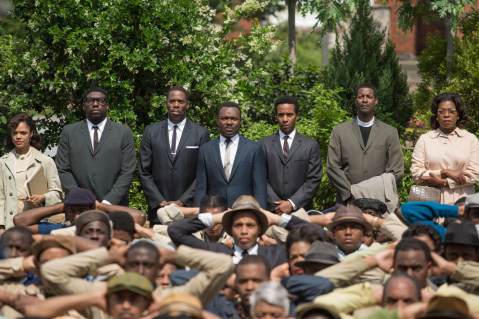
Recent Comments